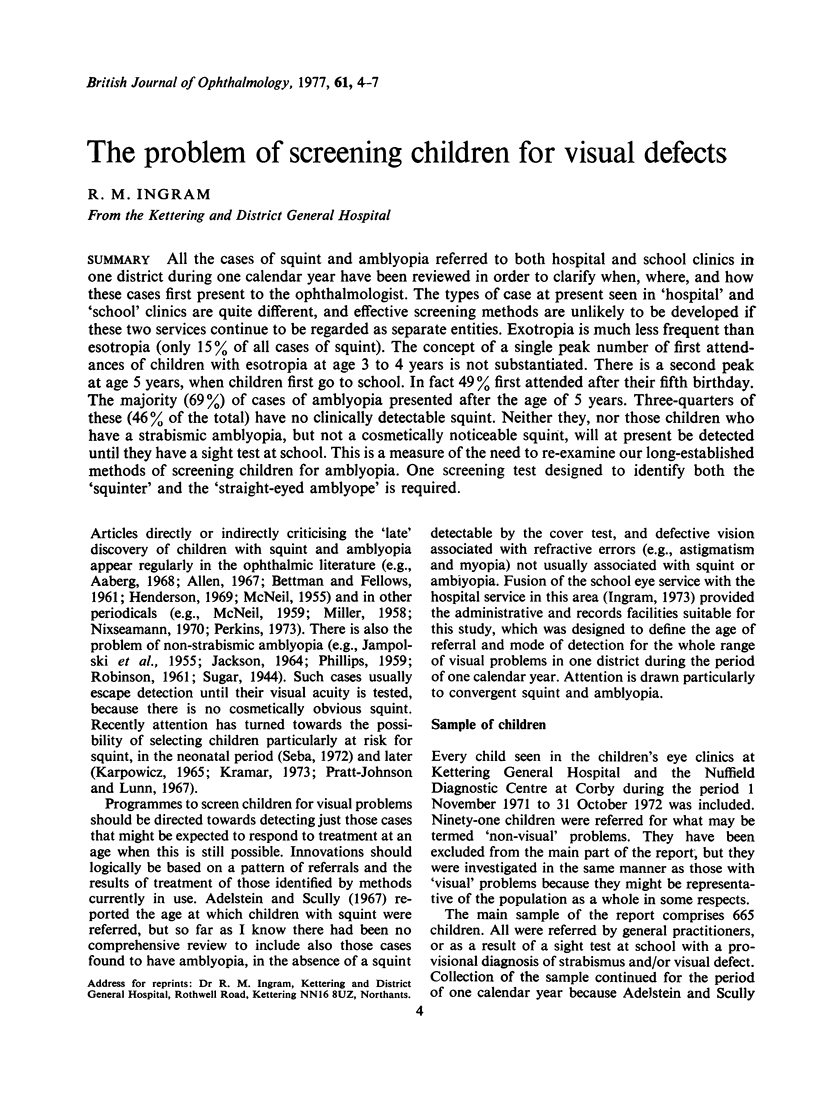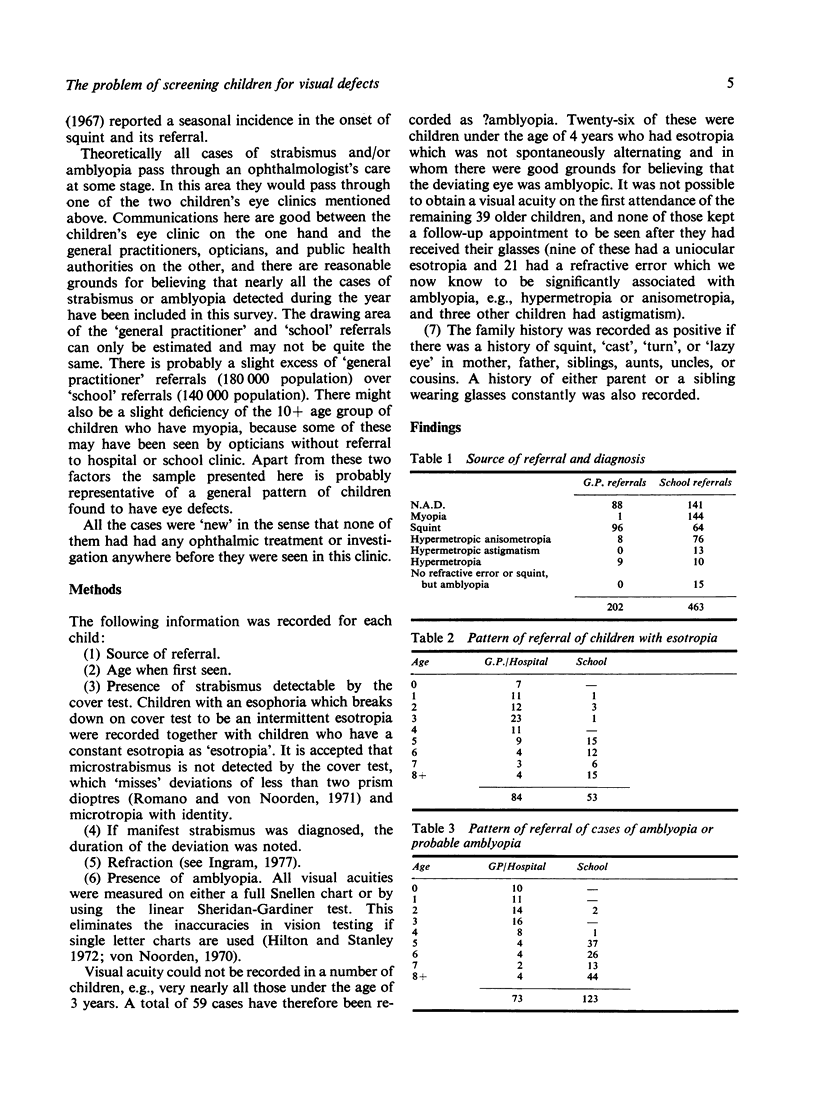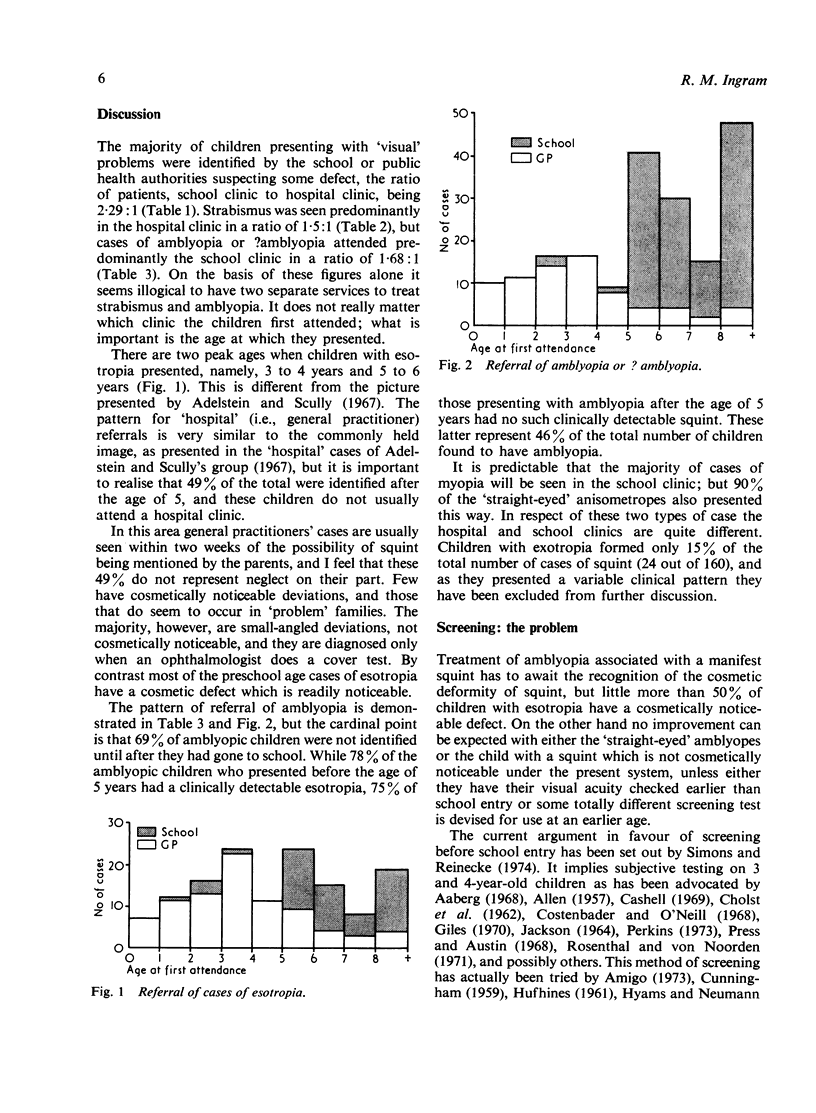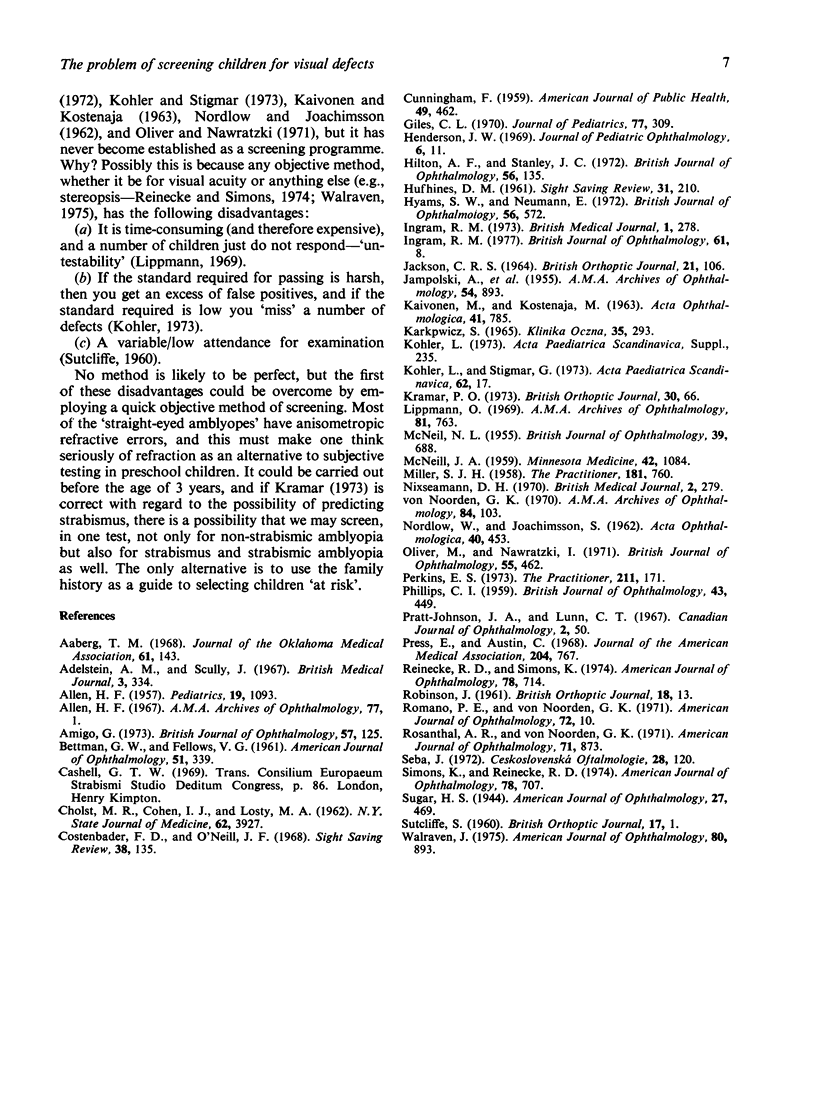Abstract
All the cases of squint and amblyopia referred to both hospital and school clinics in one district during one calendar year have been reviewed in order to clarify when, where, and how these cases first present to the ophthalmologist. The types of case at present seen in "hospital" and "school" clinics are quite different, and effective screening methods are unlikely to be developed if these two services continue to be regarded as separate entities. Exotropia is much less frequent than esotropia (only 15% of all cases of squint). The concept of a single peak number of first attendances of children with esotropia at age 3 to 4 years is not substantiated. There is a second peak at age 5 years, when children first go to school. In fact 49% first attended after their fifth birthday. The majority (69%) of cases of amblyopia presented after the age of 5 years. Three-quarters of these (46% of the total) have no clinically detectable squint. Neither they, nor those children who have a strabismic amblyopia, but not a cosmetically noticable squint, will at present be detected until they have a sight test at school. This is a measure of the need to re-examine our long-established methods of screening children for amblyopia. One screening test designed to identify both the "squinter" and the "straight-eyed amblyope" is required.
Full text
PDF



Selected References
These references are in PubMed. This may not be the complete list of references from this article.
- ALLEN H. F. Testing of visual acuity in preschool children; norms, variables and a new picture test. Pediatrics. 1957 Jun;19(6):1093–1100. [PubMed] [Google Scholar]
- Adelstein A. M., Scully J. Epidemiological aspects of squint. Br Med J. 1967 Aug 5;3(5561):334–338. doi: 10.1136/bmj.3.5561.334. [DOI] [PMC free article] [PubMed] [Google Scholar]
- Amigo G. Pre-school vision study. Br J Ophthalmol. 1973 Feb;57(2):125–132. doi: 10.1136/bjo.57.2.125. [DOI] [PMC free article] [PubMed] [Google Scholar]
- CHOLST M. R., COHEN I. J., LOSTY M. A. Evaluation or amblyopia problem in the child. N Y State J Med. 1962 Dec 15;62:3927–3930. [PubMed] [Google Scholar]
- Costenbader F. D., O'Neill J. F. Ocular examination before the age of four years. Sight Sav Rev. 1968 Fall;38(3):135–140. [PubMed] [Google Scholar]
- Giles C. L. Detection of amblyopia in the preschool child. J Pediatr. 1970 Aug;77(2):309–310. doi: 10.1016/s0022-3476(70)80344-4. [DOI] [PubMed] [Google Scholar]
- Hilton A. F., Stanley J. C. Pitfalls in testing children's vision by the Sheridan Gardiner single optotype method. Br J Ophthalmol. 1972 Feb;56(2):135–139. doi: 10.1136/bjo.56.2.135. [DOI] [PMC free article] [PubMed] [Google Scholar]
- Hyams S. W., Neumann E. Picture cube for vision screening of pre-school children. Br J Ophthalmol. 1972 Jul;56(7):572–573. doi: 10.1136/bjo.56.7.572. [DOI] [PMC free article] [PubMed] [Google Scholar]
- Ingram R. M. Refraction as a basis for screening children for squint and amblyopia. Br J Ophthalmol. 1977 Jan;61(1):8–15. doi: 10.1136/bjo.61.1.8. [DOI] [PMC free article] [PubMed] [Google Scholar]
- Ingram R. M. Role of the school eye clinic in modern ophthalmology. Br Med J. 1973 Feb 3;1(5848):278–280. doi: 10.1136/bmj.1.5848.278. [DOI] [PMC free article] [PubMed] [Google Scholar]
- JAMPOLSKY A., FLOM B. C., WEYMOUTH F. W., MOSES L. E. Unequal corrected visual acuity as related to anisometropia. AMA Arch Ophthalmol. 1955 Dec;54(6):893–905. doi: 10.1001/archopht.1955.00930020899013. [DOI] [PubMed] [Google Scholar]
- KAIVONEN M., KOSKENOJA M. VISUAL SCREENING FOR CHILDREN AGED FOUR YEARS AND PRELIMINARY EXPERIENCE FROM ITS APPLICATION IN PRACTICE. (A PRELIMINARY REPORT). Acta Ophthalmol (Copenh) 1963;41:785–786. [PubMed] [Google Scholar]
- KARPOWICZ S. 10 LAT A.P.A. (ACTIO PRAEVENTIVA ANTISTRABISMATICA) W OPOLU. Klin Oczna. 1965;35:293–296. [PubMed] [Google Scholar]
- Köhler L., Stigmar G. Vision screening of four-year-old children. Acta Paediatr Scand. 1973 Jan;62(1):17–27. doi: 10.1111/j.1651-2227.1973.tb08060.x. [DOI] [PubMed] [Google Scholar]
- Lippmann O. Vision of young children. Arch Ophthalmol. 1969 Jun;81(6):763–775. doi: 10.1001/archopht.1969.00990010765003. [DOI] [PubMed] [Google Scholar]
- MCNEIL N. L. Patterns on visual defects in children. Br J Ophthalmol. 1955 Nov;39(11):688–701. doi: 10.1136/bjo.39.11.688. [DOI] [PMC free article] [PubMed] [Google Scholar]
- MILLER S. J. Strabismus. Practitioner. 1958 Dec;181(1086):760–762. [PubMed] [Google Scholar]
- McNEILL J. A. The detection of strabismus in a pre-school examination. Minn Med. 1959 Aug;42(8):1084–1085. [PubMed] [Google Scholar]
- NORDLOW W., JOACHIMSSON S. A screening test for visual acuity in four year old children. Acta Ophthalmol (Copenh) 1962;40:453–462. doi: 10.1111/j.1755-3768.1962.tb07816.x. [DOI] [PubMed] [Google Scholar]
- Nixseaman D. H. Amblyopia or the lazy eye. Br Med J. 1970 May 2;2(5704):279–281. doi: 10.1136/bmj.2.5704.279. [DOI] [PMC free article] [PubMed] [Google Scholar]
- Oliver M., Nawratzki I. Screening of pre-school children for ocular anomalies. I. Screening methods and their practicability at different ages. Br J Ophthalmol. 1971 Jul;55(7):462–466. doi: 10.1136/bjo.55.7.462. [DOI] [PMC free article] [PubMed] [Google Scholar]
- PHILLIPS C. I. Strabismus, anisometropia, and amblyopia. Br J Ophthalmol. 1959 Aug;43:449–460. doi: 10.1136/bjo.43.8.449. [DOI] [PMC free article] [PubMed] [Google Scholar]
- Perkins E. S. Screening for ophthalmic conditions. Practitioner. 1973 Aug;211(262):171–177. [PubMed] [Google Scholar]
- Pratt-Johnson J. A., Lunn C. T. Early case finding and the hereditary factor in strabismus. Can J Ophthalmol. 1967 Jan;2(1):50–53. [PubMed] [Google Scholar]
- Press E., Austin C. Screening of preschool children for amblyopia. Administration of tests by parents. JAMA. 1968 May 27;204(9):767–770. [PubMed] [Google Scholar]
- Reinecke R. D., Simons K. A new stereoscopic test for amblyopia screening. Am J Ophthalmol. 1974 Oct;78(4):714–721. doi: 10.1016/s0002-9394(14)76311-1. [DOI] [PubMed] [Google Scholar]
- Romano P. E., von Noorden G. K. Limitations of cover test in detecting strabismus. Am J Ophthalmol. 1971 Jul 30;72(1):10–12. doi: 10.1016/0002-9394(71)91585-6. [DOI] [PubMed] [Google Scholar]
- Rosenthal A. R., Von Noorden G. K. Clinical findings and therapy in unilateral high myopia associated with amblyopia. Am J Ophthalmol. 1971 Apr;71(4):873–879. doi: 10.1016/0002-9394(71)90258-3. [DOI] [PubMed] [Google Scholar]
- Seba J. Vysetrení novorozenců s cílem casného záchytu detí ohrozený ch silháním. Cesk Oftalmol. 1972 Mar;28(2):120–126. [PubMed] [Google Scholar]
- Simons K., Reinecke R. D. A reconsideration of amblyopia screening and stereopsis. Am J Ophthalmol. 1974 Oct;78(4):707–713. doi: 10.1016/s0002-9394(14)76310-x. [DOI] [PubMed] [Google Scholar]
- Von Noorden G. K. Strabismus. Arch Ophthalmol. 1970 Jul;84(1):103–122. doi: 10.1001/archopht.1970.00990040105025. [DOI] [PubMed] [Google Scholar]
- Walraven J. Amblyopia screening with random-dot stereograms. Am J Ophthalmol. 1975 Nov;80(5):893–900. doi: 10.1016/0002-9394(75)90286-x. [DOI] [PubMed] [Google Scholar]


